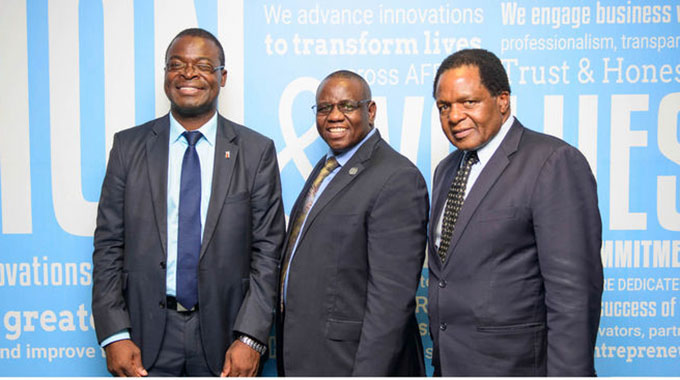‘Innovation will drive industrialisation’

Golden Sibanda Senior Business Reporter
ZIMBABWE is poised for rapid industrialisation propelled by the wheels of a knowledge-based or driven economy that creates highly skilled workers while producing patented innovations, according to a Cabinet minister. The southern African country has already made giant strides, in line with Government’s vision of building a knowledge-based economy, in setting up innovation hubs across Zimbabwe’s major tertiary institutions, which will incubate ideas and immediately have the successful ones registered and patented.
Reservations abound that the country is over-dependent on low-value raw exports, which means it is losing significant potential earnings from value added products while at the same time exporting millions of jobs.
Estimates show that nearly three quarters of economically active Zimbabweans are not formally employed with the majority surviving on low income informal jobs.
However, research on contemporary global economic dynamics shows that the future of the world economy largely hinges on innovation and so companies that want to succeed and be competitive should be inspired to innovate.
To that end, the solution lies in moving beyond brainstorming ideas to nurturing real innovations that flourish through production of goods and services.
Higher and Tertiary Education Minister Professor Amon Murwira said the innovation hubs were “structural ideas”, which Zimbabwe was organising itself to exploit.
He made the remarks while addressing and responding to legislators during a 2020 National Budget seminar at Elephant Hills, Victoria Falls, last week.
He said Zimbabwe’s innovation hubs will come up with research-based ideas, which Government will fund and facilitate registration and patenting processes.
“The Ministry of Justice (Legal and Parliamentary Affairs) is going to be very busy, I can assure you; very busy processing patents for Zimbabwe and we are just providing a way (through innovation hubs) in which these things can happen. And also, these (innovation hubs) are going to cause the industrialisation and they are a means to industrialisation of this country.
“We are serious about what we are doing; we are convinced that we can change this country if we have a really good philosophy and good unity of purpose,” he said.
Government has already completed setting up innovation hubs at Chinhoyi University of Technology, Harare Institute of Technology (HIT), Midlands State University (MSU) and National University of Since and Technology (NUST).
“Our innovation hubs are not just buildings; they are a concept for jumping out of the cage of colonisation to working and producing,” he said.
Already, at the Chinhoyi University of Science and Technology (CUT), Government has built an industrial park that is now producing cattle feed while the institution also now has capacity to produce hybrid cattle semen for export.
“And Chinhoyi University was able to start an artificial insemination project where (the institution now has) capability to produce 7 million semen straws annually and each costs something like US$20 if you are exporting.
“This means Chinhoyi University of Technology now has an industrial base worth US$140 million. This is not fiction; it’s there. We believe that with patience and unity of purpose as Zimbabweans, we are going to change this country,” he said.
Like other tertiary institutions, NUST’s innovation hub has been completed with all the necessary equipment having been installed, and as of last week only the air-conditioning, which was scheduled to be installed this week, was outstanding.
“NUST is specialising in genetics. Remember that, for instance, if there is a fire and someone is burnt beyond recognition, NUST now has that capability to do that (establish the identity), we have bought all that equipment.
“We believe that this is the way to industrialise; we are patient; we know that it cannot happen in one day. The purpose of training institutions is to give birth to new industry; to give birth to new jobs whose name we do not know today.
“We are tasked to produce jobs that do not exist today; whose names we do not know today. One, these are the new industries. Number two, (Zimbabwe’s training institutions are there) to support the existing industry. So, our policy is to make sure that we have all those two lines open.
“The other issue is about how do we get the jobs? Our current philosophy is very simple; it’s telling us that jobs are created by skills.
“If somebody tells you that they will create a job for you and you come and work, they are still a colonised mind. Jobs are created by skills, jobs respond to human needs. People need to sleep, therefore you must make beds. People need to eat, it means that your education must produce people who can farm, who can produce things and not who wait for another person as if you are waiting for some deity. We are past that era.
“We believe that is the way. Zimbabwe could not move because we thought jobs could come here so that we could work; coming here from where? So when you analyse, you see that jobs do not come to Zimbabwe, but Zimbabwe makes jobs,” he said.
Minister Murwira said Zimbabwe had plenty of jobs, but lacked the necessary skills to exploit these opportunities into jobs. “So I want to assure you, jobs will be there; let’s not imagine that they will come tomorrow by a magic wand. They will come through this industrialisation process,” the minister said.
Weighing in on the issue, Finance and Economic Minister Mthuli Ncube said the innovation hubs were part of Education 5.0, which seeks to create an eco-system that generates research-based ideas.
The ideas are then incubated in the innovation hubs, the tertiary institutions, and then tested in industry before they are commercialised and patented.
“What (Minister) Murwira is talking about is research-based industrialisation, which is part of the broader industrialisation agenda, which is commercialising research ideas coming out of universities.
“What he has done under Education 5.0 is to create an entrepreneurship ecosystem that starts from research all the way, a bit of teaching, but mainly research and then the incubation of the ideas in these innovation hubs then industrial parks and finally its commercialised,” Minister Ncube said










Comments